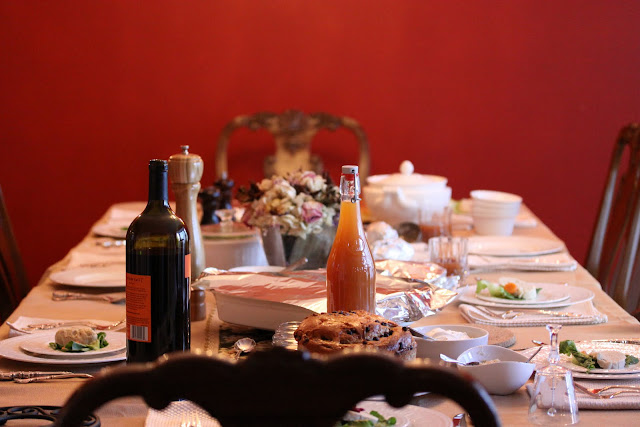Everyone has a few household items or foods that they call by an odd name. Maybe it originally descended from a family member who speaks another language or maybe one day someone was at a loss for words and just made one up that stuck. Whatever the reason, the words become a natural, integrated part of your vocabulary and you forget that the general population doesn't have a clue what you are talking about (I actually do this fairly frequently). For example the first time I heard someone use the slang term "po-po" to refer to the police I was utterly confused because in my family, we called the end of a loaf of bread the "po-po". I was probably 16 and the conversation went something like this:
Friend: There's a tree blocking the road we can't go into town: but don't worry the po-po is on their way, it'll be cleared soon.
Me: Wait, what? Who's coming?
Friend: The po-po, to deal with the fallen tree.
Me: The end-of-the-bread is going to clear the tree from the road??
Friend: What are you talking about? The police are coming; po-po = police.
Me: Ohhhhhh, well not in my house it doesn't...
Or try sitting in your freshman dorm in college with a roommate that you barely know and asking her to pass the doo-hickey (TV remote or sometimes whatever it is that you want but can't seem to remember the name of, at which time you point and call it a doo-hickey).
Yea, I got a weird look for that one.
Sometimes, the real word just doesn't fit the item or food as well as the made-up word. In that case it's best to carry on as if the whole world calls it that same thing. Most likely no one will question you and in some cases they'll understand why it's so fitting. For example, the word "goop". Growing up in my house, this referred to the mixture of chopped vegetables, wine and broth that a brisket roasted with in the oven. They're finely chopped and kind of soupy, floating around next to the meat. After the brisket is done roasting (for 3 1/2 hours) the chopped vegetables get strained out of the sauce and plopped into a bowl to be served along side the meat and sauce. The words "chopped vegetables" just don't seem to fit. It's still a little liquid-y and the little bits are kind of uniformly sized, honestly I just can't think of any word for it besides "goop" and that's what has stuck all these years.

Beef Brisket with "Goop", Baby Carrots and Pearl Onions
Beef broth lends a deeper richer flavor but either chicken broth also works. Any combination of the two is fine as well. / Serves 8
1 3.5lb Flat-cut beef brisket, fat trimmed
3 tablespoons olive oil
7 cups (900g) finely chopped onions
1 cup finely chopped onions
1 cup finely chopped celery
2 tablespoons finely chopped garlic
1 750ml bottle dry red wine
8 large fresh thyme sprigs
1 tablespoon finely chopped fresh thyme
2 bays leaves
13 cups low-sodium chicken or beef broth
1lb baby carrots
12oz pearl onions, blanched and peeled
Preheat oven to 450 degrees
Sprinkle meat with salt in pepper
Heat 2 tablespoons oil in a large, wide pot of medium-high heat.
Brown brisket - about 5 minutes per side - and transfer to a large roasting pan. Set aside.
Add chopped onions, garlic, celery and carrots to the original pot and saute until golden, about 10 minutes.
Add wine, thyme sprigs and bay leaves to pot. Boil until liquid is reduced to about 5 cups, about 10 minutes. Add both and bring to a boil.
This is a TON of liquid but it will reduce significantly and you definitely need all of it to ensure there is enough liquid throughout the whole cooking time.
Pour wine mixture over brisket to fill 2/3 of the pan, reserve remaining wine mixture.
Roast brisket uncovered until very tender, turning and basting occasionally and adding more of the wine mixture as necessary to keep the pan 2/3 full, about 3 1/2 hours.
Remove the meat to a cutting board or platter.
Strain pan juices into a bowl pressing on solids and set aside.
Remove the time sprigs and bay leaves and discard.
*Puree the solids (aka the vegetables or "goop") until blended but still chunky and spoon into a bowl. Gradually whisk a little of the puree into the gravy adding more as needed to thicken but not too much as the gravy will continue to thicken on its own. If you accidentally add too much just whisk in a little broth to thin out again.
Season both sauce and "goop" with salt and pepper and set aside.
Thinly slice the meat across the grain.
Heat 1 tablespoon oil in a large frying pan over medium high heat. Add baby carrots, pearl onions and 1 tablespoon chopped fresh thyme; saute until golden, about 5 minutes. Cover and cook until vegetables are crisp-tender, about 5 minutes. Season with salt and pepper.
Serve meat with sauce, "goop" carrots, and pearl onions.
The meat, sauce and "goop" freeze well either separately or mixed together into ready to go portions.
*I completely forgot this step last night which is why my sauce was too thin and my "goop" just looks like chopped up vegetables. It's not a huge deal but it's definitely worth the extra step.






















